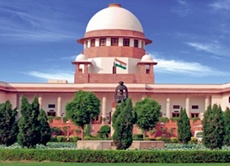Right to privacy cannot be taken as absolute: SC
19 Jul 2017
The Supreme Court today observed that while citizens have right to privacy and the Constitution ensures this, any attempt to define privacy as an absolute right would be against the spirit of the state as it is.
 The apex court noted that any attempt to stretch the definition and extend of the right to privacy might cause more harm than good.
The apex court noted that any attempt to stretch the definition and extend of the right to privacy might cause more harm than good.
Privacy is not absolute and the state cannot be prevented from making laws imposing reasonable restrictions on citizens, the Supreme Court observed while hearing arguments against making Aadhar identification mandatory for dealings with the government and public utilities.
In fact, the court noted that 'right to privacy' is too ''amorphous'' a term. To recognise privacy as a definite right, it has to be define first. But this would be nearly impossible as an element of privacy pervaded all the fundamental rights enshrined in the Constitution.
''How do we define privacy? What are its contents? Its contours? How can the state regulate privacy? What obligations do the state have to protect a person's privacy?'' Justice Chandrachud asked the petitioners who have challenged the Aadhaar law on the ground that it affects the privacy of citizens.
The court said that an attempt to define the right to privacy may cause more harm than good, adding that any attempt by the courts to catalogue what all constitutes privacy may limit the right itself, Justice Chandrachud observed.
Justice Chandrachud is part of a nine-judge Constitution Bench, led by Chief Justice of India JS Khehar, examining a reference on the question whether privacy is sacred, fundamental and an inviolable right under the Constitution.
Attorney General KK Venugopal had submitted in the court that right to privacy is merely a common law right and the Constitution makers ''consciously avoided'' making it a part of the fundamental rights.
The decision of the nine-judge Bench on whether privacy is a fundamental right or not will be pivotal to the petitioners' challenge that Aadhaar, which mandates citizens to part with their biometrics, is unconstitutional.
In the day-long hearing before a packed courtroom, the Bench questioned the petitioners' plea that right to privacy is non-negotiable.
''If people have put themselves in the public realm using technology, is that not a surrender of their right to privacy'' Justice Chandrachud asked.
The petitioners, on the other hand, is using union finance minister Arun Jaitley's statement in Parliament that privacy is ''probably'' a fundamental right and a ''part of individual liberty''.
The minister made the statement while presenting of the Aadhaar Bill in Parliament on 16 March 2016.
Senior advocate Shyam Divan, appearing for the petitioners, submitted that a person should have the right to ''informational self-determination''.
''In the Internet age, a person should have control on how much he should put forward and not be compelled,'' Divan submitted.
He said there was hardly any data protection in this digital age, inevitably leading to a compromise in privacy.
But Justice Chandrachud observed that right to privacy cannot be linked to data protection. He said this is the age of ''big data'', and instead of focusing on privacy, steps need to be taken to give statutory recognition to data protection.



















